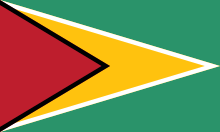Guyanese people
 | |
| Total population | |
|---|---|
| c. 1,250,000 | |
| Regions with significant populations | |
| 281,371[citation needed] | |
| 84,275[1] | |
| 40,872[citation needed] | |
| 14,560[citation needed] | |
| 11,530[citation needed] | |
| 7,401[citation needed] | |
| 1,000[citation needed] | |
| 1,000[citation needed] | |
| 1,000[citation needed] | |
| Languages | |
| English, Guyanese Creole, Guyanese Hindustani, Tamil, Chinese, Portuguese, Spanish, Dutch, Indigenous languages | |
| Religion | |
| Christianity (Roman Catholic, Protestants), Hinduism, Islam, Rastafarian, Baháʼí, Buddhism, Afro-American religions, Traditional African religions, Chinese folk religion (Taoism and Confucianism) | |
The people of Guyana, or Guyanese, come from a wide array of backgrounds and cultures including aboriginal Amerindians, and those who descended from the slaves brought to work in the sugar industry of the Caribbean by various European interests, mostly of Indian or African origins. Demographics as of 2012 are East Indian 39.8%, African 30.1%, mixed race (mostly Dougla and mulatto) 19.9%, Amerindian 10.5%, other 0.5% (includes Portuguese, Chinese, White).
Even though Guyana is a part of the South American mainland, it is much more culturally similar to the Suriname and nearby island nations of the Caribbean such as Trinidad and Tobago, and is considered a culturally Caribbean country even though it is not an island nation located in the Caribbean Sea.[2]
The national anthem of Guyana, Dear Land of Guyana, of Rivers and Plains, refers to Guyana as the "Land of six peoples"[3] which was historically considered to be made up of African, Indian, Chinese, Portuguese, European, and Amerindian people.[4]
Demographics[]
Even though referred to collectively as Amerindians, the indigenous peoples in Guyana are made up of several distinct tribes or nations. Warao, Arawak, Caribs, and Wapishana are all represented in Guyana.[5]
Europeans arrived in the Guianas in the search for gold in the New World, eventually settling in and colonizing Guyana and the Americas. Starting with the Dutch, then English, the cultural presence of Europe has been a significant force in the country even though the population was always in the minority. French and Spanish also have a presence in the region.[6]
The climate of Guyana was deemed suitable for growing sugar cane, sparking a demand for labor unmet by the Europeans themselves or the local Amerindians, so slaves from Africa were brought into the country. The high mortality and low birthrate of plantation slavery was supplemented by bringing in more enslaved people until the slave trade was abolished in 1838.[7] Indentured labor contracts were made for Portuguese and Chinese people,[8] but the largest numbers came from India.
The diversity of the country is a point of pride as well as a challenge; conflicts along racial lines have been a source of significant social tension. Racism in Guyana has roots in the control of labor, so that plantation owners could maintain a stratified society of subservient workers and limit competition for the highest social class. Many segments of society are divided by race, such as religion, politics, even industries.[9]
Language[]
Guyana's culture reflects its European history as it was colonized by both the Dutch and French before becoming a British colony. Guyana (known as British Guiana under British colonial rule), gained its independence from the United Kingdom in 1966 and subsequently became a republic in 1970. As a result of Guyana's 170-year history as a British colony, it is a part of the Anglophone world and considered to be a part of the Anglophone Caribbean - a subregion of the Caribbean consisting of independent, English-speaking nations that were once British colonies (also known as the Commonwealth Caribbean). Even as the only English-speaking country in South America, the majority of people in Guyana actually speak Guyanese Creole informally. Standard English, i.e. British English spelling and pronunciation, is used for all business and education and is typically consistently spoken by members of the upper and upper-middle class.[10]
See also[]
- Guyanese Canadians
- Women of Guyana
- History of Guyana
- Guyanese Americans
References[]
- ^ Government of Canada, Statistics Canada (8 February 2017). "Census Profile, 2016 Census - Canada [Country] and Canada [Country]". www12.statcan.gc.ca.
- ^ "Guyana - The World Factbook". www.cia.gov. Retrieved 2021-02-09.
- ^ Loza, Léna (2007-05-01). "Le Guyana: "Land of Six Peoples" ou "One People, One Nation" ?". Caliban. French Journal of English Studies (in French) (21): 81–89. doi:10.4000/caliban.1872. ISSN 2425-6250.
- ^ Agriculture, United States Congress House Committee on (1965). Amend and Extend the Sugar Act of 1948: Hearings Before the Committee on Agriculture, House of Representatives, Eighty-ninth Congress, First Session, on H.R. 10496. U.S. Government Printing Office.
- ^ Menezes, Mary Noel (1979). The Amerindians in Guyana, 1803-73: A Documentary History. Taylor & Francis. ISBN 978-0-7146-4030-3.
- ^ "Guyana - BRITISH TAKE OVER". countrystudies.us. Retrieved 2021-02-09.
- ^ "Guyana - ETHNIC GROUPS". countrystudies.us. Retrieved 2021-02-09.
- ^ "Hailing contributions of Chinese, President says new arrivals welcome". Stabroek News. 2018-01-13. Retrieved 2021-02-09.
- ^ "Guyana - ETHNIC GROUPS". countrystudies.us. Retrieved 2021-02-09.
- ^ "Of Creole language, dialect and literature". Stabroek News. 2018-05-13. Retrieved 2021-02-09.
External links[]
- Guyanese people
- South American people by nationality
